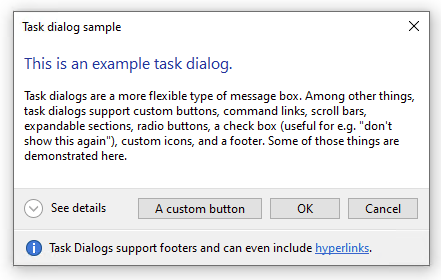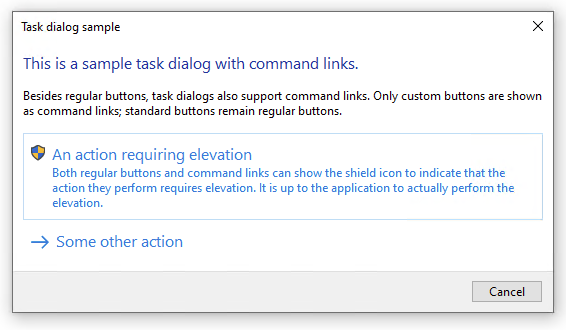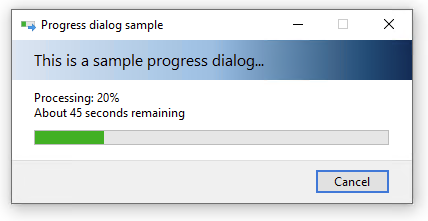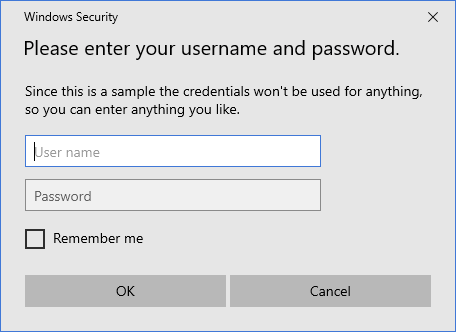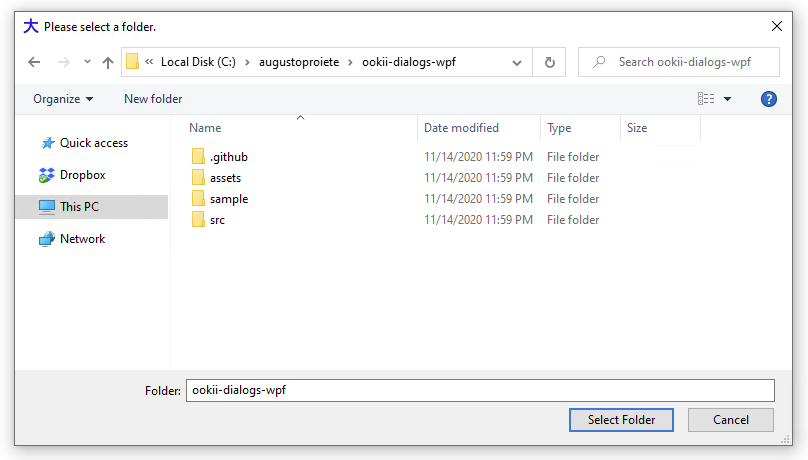ookii-dialogs / Ookii Dialogs Wpf
Labels
Projects that are alternatives of or similar to Ookii Dialogs Wpf
| README.md |
|---|
Ookii.Dialogs.Wpf
A class library for WPF applications providing several common dialogs. Included are classes for task dialogs, credential dialog, progress dialog, and common file dialogs.
Give a Star! ⭐️
If you like or are using this project please give it a star. Thanks!
Getting started
Install the Ookii.Dialogs.Wpf package from NuGet:
Install-Package Ookii.Dialogs.Wpf
The included sample application Ookii.Dialogs.Sample.Wpf demonstrate the dialogs for WPF. View the source of this application to see how to use the dialogs.
Windows Forms compatibility
If you're looking to use these common dialogs on a Windows Forms application, check out Ookii.Dialogs.WinForms.
Included dialogs
Task dialog
Task dialogs are a new type of dialog first introduced in Windows Vista. They provide a superset of the message box functionality.
The Ookii.Dialogs.Wpf.TaskDialog class provide access to the task dialog functionality. The TaskDialog class inherits from System.ComponentModel.Component and offers full support for the Component designer of Visual Studio.
The TaskDialog class requires Windows Vista or a later version of Windows. Windows XP is not supported. Note that it is safe to instantiate the TaskDialog class and set any of its properties; only when the dialog is shown will a NotSupportedException be thrown on unsupported operating systems.
Progress dialog
Progress dialogs are a common dialog to show progress during operations that may take a long time. They are used extensively in the Windows shell, and an API has been available since Windows 2000.
The Ookii.Dialogs.Wpf.ProgressDialog class provide a wrapper for the Windows progress dialog API. The ProgressDialog class inherits from System.ComponentModel.Component and offers full support for the Component designer of Visual Studio. The ProgressDialog class resembles the System.ComponentModel.BackgroundWorker class and can be used in much the same way as that class.
The progress dialog's behaviour of the ShowDialog function is slightly different than that of other .NET dialogs; It is recommended to use a non-modal dialog with the Show function.
The ProgressDialog class is supported on Windows XP and later versions of Windows. However, the progress dialog has a very different appearance on Windows Vista and later (the image above shows the Windows 10 version), so it is recommended to test on the operating systems your application is supported to see if it appears to your satisfaction.
When using Windows 7 or later, the ProgressDialog class automatically provides progress notification in the application's task bar button.
Credential dialog
The Ookii.Dialogs.Wpf.CredentialDialog class provide wrappers for the CredUI functionality first introduced in Windows XP. This class provides functionality for saving and retrieving generic credentials, as well as displaying the credential UI dialog. This class does not support all functionality of CredUI; only generic credentials are supported, thing such as domain credentials or alternative authentication providers (e.g. smart cards or biometric devices) are not supported.
The CredentialDialog class inherits from System.ComponentModel.Component and offers full support for the Component designer of Visual Studio.
On Windows XP, the CredentialDialog class will use the CredUIPromptForCredentials function to show the dialog; on Windows Vista and later, the CredUIPromptForWindowsCredentials function is used instead to show the new dialog introduced with Windows Vista. Because of the difference in appearance in the two versions (the image above shows the Vista version), it is recommended to test on both operating systems to see if it appears to your satisfaction.
Vista-style common file dialogs
Windows Vista introduced a new style of common file dialogs. As of .NET 3.5 SP1, the Windows Forms OpenFileDialog and SaveFileDialog class will automatically use the new style under most circumstances; however, some settings (such as setting ShowReadOnly to true) still cause it to revert to the old dialog. The FolderBrowserDialog still uses the old style. In WPF, the Microsoft.Win32.OpenFileDialog and SaveFileDialog classes still use the old style dialogs, and a folder browser dialog is not provided at all.
The Ookii.Dialogs.Wpf.VistaOpenFileDialog, Ookii.Dialogs.Wpf.VistaSaveFileDialog and Ookii.Dialogs.Wpf.VistaFolderBrowserDialog classes provide these dialogs for WPF (note that in the case of the OpenFileDialog and SaveFileDialog it is recommended to use the built-in .NET classes unless you hit one of the scenarios where those classes use the old dialogs).
The classes have been designed to resemble the original WPF classes to make it easy to switch. When the classes are used on Windows XP, they will automatically fall back to the old style dialog; this is also true for the VistaFolderBrowserDialog; that class provides a complete implementation of a folder browser dialog for WPF, old as well as new style.
.NET Core 3.1 & .NET 5 pre-requisites before Ookii.Dialogs.Wpf v3.1.0
NOTE: Starting with Ookii.Dialogs.Wpf v3.1.0 an app.manifest is no longer required when using in .NET 5 or .NET Core 3.1 apps
Ookii Dialogs leverages the components and visual styles of the Windows Common Controls library (comctl32.dll), and WPF applications targeting .NET Core 3.1 and/or .NET 5 must add an application manifest (app.manifest) to their projects with a reference to Microsoft.Windows.Common-Controls.
Without the application manifest, you'll get an error with a message similar to the below:
System.EntryPointNotFoundException: 'Unable to find an entry point named '...' in DLL 'comctl32.dll'.'
In Visual Studio, you can right click on your project and go to Add -> New Item... and select Application Manifest File (Windows Only). That will create a template that you can customize and delete the parts you don't want and/or uncomment the parts that you want. The only required part for Ookii Dialogs to work is the dependentAssembly entry with the Microsoft.Windows.Common-Controls dependency.
<?xml version="1.0" encoding="utf-8"?>
<assembly manifestVersion="1.0" xmlns="urn:schemas-microsoft-com:asm.v1">
<!-- (...) -->
<!-- Enable themes for Windows common controls and dialogs (Windows XP and later) -->
<dependency>
<dependentAssembly>
<assemblyIdentity
type="win32"
name="Microsoft.Windows.Common-Controls"
version="6.0.0.0"
processorArchitecture="*"
publicKeyToken="6595b64144ccf1df"
language="*"
/>
</dependentAssembly>
</dependency>
</assembly>
For more information, visit the following links:
- EntryPointNotFoundException when instantiating a TaskDialog
- WPF System.EntryPointNotFoundException: Unable to find an entry point named 'TaskDialogIndirect' in DLL 'comctl32.dll'
- Calls to comctl32.dll succeed in .NET 4.8, but fail in .NET 5 with System.EntryPointNotFoundException
Release History
Click on the Releases tab on GitHub.
Copyright © 2009-2021 Ookii Dialogs Contributors - Provided under the BSD 3-Clause "New" or "Revised" License.







